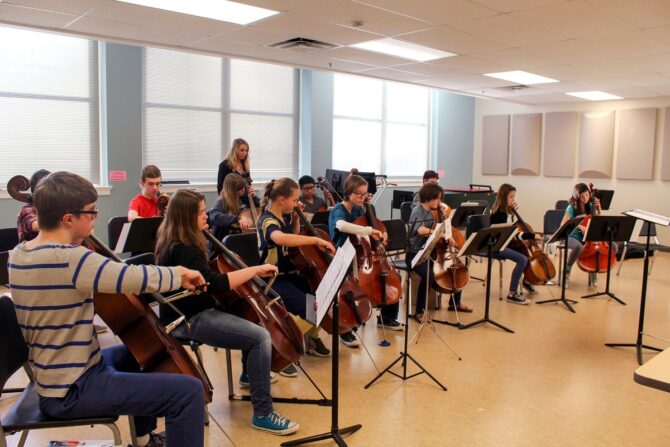Music Education in Schools and Its Importance

Music education has enormous benefits in helping children’s learning process even at an early age. Channeled creativity will help develop thinking patterns and also make children better academically and develop their social talents, so this is very important for children.
You can find various types of music by visiting YTMP3 – Youtube to Mp3 Converter. In other words, you can get lots of music learning material to children with the many genres available there.
Increasing intelligence in children is also stimulated by music, so don’t hesitate to introduce music as a means of learning for children.
Music Education and Its Impact on Learning
Music can help children learn a new language so that their linguistic skills will also be honed. Music has a composition of lyrics accompanied by addictive music which helps the absorption of new vocabulary.
When students are exposed to music in a foreign language, they not only hear new vocabulary but also how sentences are formed so that they also learn the correct language structure.
Do you realize that you have ever experienced a period where you have only heard a piece of music once but can already remember it? That means music also trains your memory indirectly. This phenomenon applies to many people even to people who are unfamiliar with music.
A melody that is created in such a way as to harmonize the lyrics and the song’s designation will add a special impression to the listener. The characteristic melody in music creates a “sticking” impression, making it easy to remember and memorize. So it is not surprising that in children’s schools, a lot of material is taught by singing.
In another aspect, students will also be trained mentally and in their understanding of the elements of music.
Mentally, students will be trained to perform, and then in terms of learning musical elements, they will be trained to understand pitch, melody, tempo or rhythm, and even harmony. All of these things are forms of skills that are closely related to the student’s level of intelligence so this adds even more value to music learning.
Benefits in Social Aspects
Not only does it influence the level of academic intelligence, but music education also develops children’s social intelligence significantly.
Music education will train students in collaboration and collaboration with other people. When making music collectively, students not only have to dare to be heard but also have to be willing to listen to others so they can maintain harmony and rhythm in their music so that everything is in harmony.
With this learning, students will learn how to appreciate and see the performance of others and even work together to achieve mutual success. They will realize that if they want to stand out too much, their balance will be disturbed.
Still related to teamwork, music can also strengthen relationships between musicians in a group emotionally. They are united by the same musical tastes and views, which makes them more united and respectful of each other. The existence of this bond will influence their life throughout the day at school.
Music education allows students to learn about other cultures. They can study comparisons of foreign music culture to have implications for their local culture. That way they will have additional insight even beyond the music itself, namely regarding the culture.
Once they understand that music depicts different cultures based on the country the music originates from, they will appreciate differences more. Students also will not easily blame cultures that are not the same as theirs.
Other Benefits for Students
Music education helps improve children’s motor coordination. Musicians play their respective roles and play musical instruments according to their talents and interests. Playing a musical instrument requires good coordination between the brain and body parts to produce beautiful and harmonious music.
Students who study music must be able to hear music and carry out research to learn how this music is played until finally they can practice it directly and produce physical music both in groups and individually.
All the activities above need to be carried out and practiced continuously and repeatedly so that they can increase the potential of the music. They will also have more time to learn coordination, synchronize their music with their teammates, and ultimately influence their personalities.
Overcoming Stress
Learning music is not tiring because students will feel entertained. After all, music is a matter of passion, so they will learn it voluntarily and reach their limits.
This fact will keep students from feeling stressed when studying music or using music in their learning stages. They can use their music to accompany their learning process to maintain their learning mood.
Music can also be used as an escape point when they are too tired of studying. Students are advised to listen to music during breaks so that they can improve their mood and enthusiasm to continue studying.
The music they can choose is music with a fast beat to increase enthusiasm, or music with a slow tempo if they need to calm the mind and heart before continuing learning. They can do this while studying alone at home.
Students can find lots of music that suits their tastes through the streaming or downloader platform which can be used to convert high-quality music videos into clear sound-quality MP3 audio files that will improve their mood better. That’s a review of the benefits of music for education, hopefully, it’s useful.
